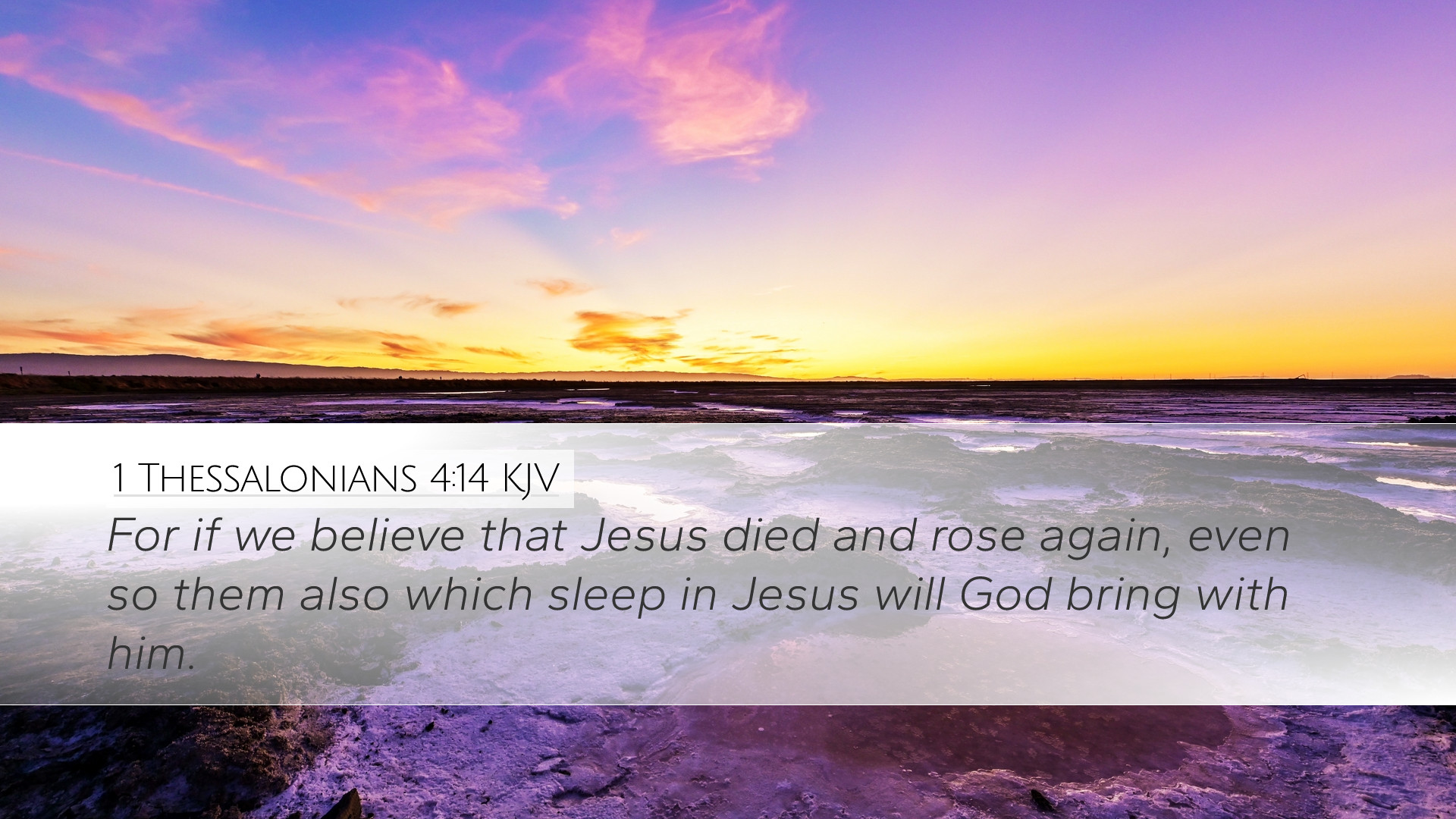Commentary on 1 Thessalonians 4:14
Verse Text: "For if we believe that Jesus died and rose again, even so them also which sleep in Jesus will God bring with him."
Introduction
This verse from Paul’s first epistle to the Thessalonians presents a profound theological assertion regarding the resurrection of the dead in Christ. It serves as a cornerstone for understanding Christian hope regarding life after death and the future resurrection. The Apostle Paul addresses the Thessalonian believers to reassure them about their loved ones who have died and shares the foundational truth about the resurrection connected to Jesus Christ.
Theological Insights
- The Reality of Christ’s Death and Resurrection: Paul emphasizes the belief that Jesus died and rose again as a fundamental tenet of Christian faith. Matthew Henry states that this event is central to the gospel and underlines the assurance believers have in the resurrection.
- The Promise of God: The phrase "even so" suggests a direct correlation between the resurrection of Jesus and the resurrection of believers. Adam Clarke interprets this as God's commitment to raise those who have died in Christ as certainly as He raised Jesus.
- Hope for the Deceased: Paul refers to the deceased believers as "them which sleep in Jesus," signifying not a finality in death but a state of rest in Christ. Albert Barnes notes that sleep here symbolizes a temporary condition before the awakening of resurrection, providing comfort to those grieving.
Contextual Background
The epistle was written to a young church experiencing persecution and uncertainty regarding the fate of believers who had died. Paul’s intent is to instruct and encourage them. Understanding the Thessalonian context is critical; they were anxious about whether their deceased brethren would miss out on the anticipated return of Christ. Thus, 1 Thessalonians 4:14 clarifies this concern and establishes a hopeful perspective on life, death, and resurrection.
Exegesis of Key Themes
The Death and Resurrection of Jesus
Paul succinctly asserts the historicity of Christ's death and resurrection. According to Matthew Henry, acknowledging the suffering of Jesus is crucial as it signifies the foundation on which Christian hope rests. His resurrection embodies victory over death, which assures believers of their future resurrection. The resurrection is an act of God that provides sufficient evidence of the sovereign power of God to fulfill promises made to His people.
Believers Who Sleep
Paul employs the metaphor of sleep, which harkens back to Jewish understanding of death. Clarke suggests that it conveys peace and temporary state rather than the finality of physical death. This term communicates the assurance that the Christian's death is not devoid of hope — rather, it is a lull from which they will awaken at Christ’s return.
God’s Sovereign Assurance
Paul confidently states that "God will bring with him" those who sleep in Jesus. This promise signifies the personal and intimate relationship between Christ and His followers. Barnes notes that this highlights not only God’s power but His desire to reunite believers with those who have gone before, emphasizing the fullness of life even after physical death.
Practical Applications
- Comfort for the Grieving: This verse is a source of tremendous comfort for those mourning the loss of loved ones in Christ, assuring them that death is not the end, but a passage to eternal life.
- Encouragement for Faith: Believers are encouraged to maintain their faith amidst trials, knowing that God's promises regarding resurrection hold true as evidenced by Christ's own resurrection.
- Hope in the Second Coming: The anticipation of Christ’s return should motivate believers towards spiritual readiness and exhort them to live in accordance with the truth of the gospel, as they look forward to their ultimate transformation.
Conclusion
1 Thessalonians 4:14 serves as a powerful reminder of the Christian hope anchored in the death and resurrection of Jesus Christ. It boldly reassures believers of the resurrection and eternal life, providing necessary encouragement in the face of life’s uncertainties and the reality of death. Through the insights from various public domain commentaries, we glean a deeper understanding of the text, echoing a timeless message of hope that resonates deeply with pastors, students, theologians, and scholars alike.


